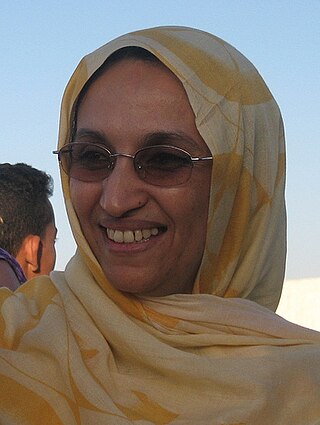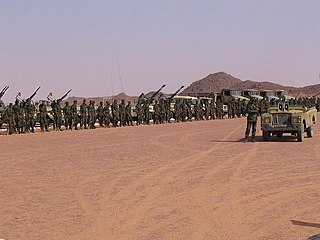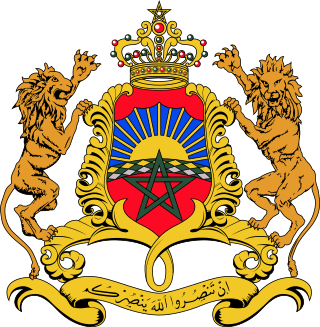
Western Sahara is a disputed territory on the northwest coast of Africa. About 20% of the territory is controlled by the Sahrawi Arab Democratic Republic (SADR); the remaining 80% is occupied and administered by neighboring Morocco. It has a surface area of 266,000 square kilometres (103,000 sq mi). It is the second most sparsely populated country in the world and most sparsely in Africa, mainly consisting of desert flatlands. The population is estimated at about 500,000, of which nearly 40% live in Morocco-controlled Laayoune, the largest city in Western Sahara.

Western Sahara, formerly the Spanish colony of Spanish Sahara, is a disputed territory claimed by both the Kingdom of Morocco and the Popular Front for the Liberation of the Saguia el Hamra and Rio de Oro, which is an independence movement based in Tifariti and Bir Lehlou. The Annexation of Western Sahara by Morocco took place in two stages, in 1976 and 1979, and is considered illegal under international law.
Sidi Mohammed Daddach is a Sahrawi human rights activist imprisoned for 24 years. He is often called "North African Mandela" or "Sahrawi Mandela".
The Movement for the Liberation of Saguia el-Hamra and Wadi el Dhahab, also referred to as the Liberation Movement, Movement for the Liberation of the Sahara, Advanced Organization of the Sahara, or simply the Muslim Party, was a Sahrawi movement created in the late 1960s by Muhammad Bassiri, a Sahrawi journalist and teacher of Qur’an.

Muhammad Sidi Brahim Sidi Embarek Basir was a Sahrawi nationalist leader, disappeared and presumedly executed by the Spanish Legion in June 1970.

The Zemla Intifada is the name used to refer to disturbances of 17 June 1970, which culminated in a massacre by Spanish Legion forces in the Zemla district of El Aaiun, Spanish Sahara.
The Independence Intifada or the Second Sahrawi Intifada and also May Intifada is a Sahrawi activist term for a series of disturbances, demonstrations and riots that broke out in May 2005 in the Moroccan-controlled parts of Western Sahara and south of Morocco. This event has also been called The El-Aaiun Intifada by the same sources.

Aminatou Ali Ahmed Haidar, sometimes known as Aminetou, Aminatu or Aminetu, is a Sahrawi human rights activist and an advocate of the independence of Western Sahara. She is often called the "Sahrawi Gandhi" or "Sahrawi Pasionaria" for her nonviolent protests. She is the president of the Collective of Sahrawi Human Rights Defenders (CODESA). She was imprisoned from 1987 to 1991 and from 2005 to 2006 on charges related to her independence advocacy. In 2009, she attracted international attention when she staged a hunger strike in Lanzarote Airport after being denied re-entry into Moroccan Western Sahara. Haidar has won several international human rights awards for her work, including the 2008 Robert F. Kennedy Human Rights Award, 2009 Civil Courage Prize and 2019 Right Livelihood Award.

The Government of Morocco sees Western Sahara as its Southern Provinces. The Moroccan government considers the Polisario Front as a separatist movement given the alleged Moroccan origins of some of its leaders.

The Western Sahara conflict is an ongoing conflict between the Sahrawi Arab Democratic Republic/Polisario Front and the Kingdom of Morocco. The conflict originated from an insurgency by the Polisario Front against Spanish colonial forces from 1973 to 1975 and the subsequent Western Sahara War against Morocco between 1975 and 1991. Today the conflict is dominated by unarmed civil campaigns of the Polisario Front and their self-proclaimed SADR state to gain fully recognized independence for Western Sahara.

Morocco became a highly repressive country under the absolute monarchy of King Hassan II, and continues to be considered repressive under the reign of King Mohammed VI, though the latter has instituted some reforms. Dozens of journalists, artists, and ordinary citizens are regularly sentenced to lengthy prison sentences for exercising basic rights enjoyed elsewhere in the world, such as freedom of the press, protesting the government, or criticizing government officials. Morocco heavily restricts basic human rights, such as freedom of speech, the right to assembly, and the right to criticize officials. Moroccans also feel the pressures of inflation within the country, such as the lack of basic services like healthcare, clean water, and the difficulty of parents to access quality education for their children. While there have been a handful of reforms that have been generally welcomed internationally, most Moroccans feel this is insufficient, and continue to be unhappy with the trajectory of the country under the policies of King Mohammed VI, despite his transition of the government to an ostensible constitutional monarchy. Under his father, King Hassan II, Morocco had one of the worst human rights records in Africa and the world, especially during the time period known as the "Years Of Lead", which lasted from the early 1960s until the late 1980s; it was a period in the country's history that was known for the brutal repression of political dissent and opposition, that involved wide-scale arrests, arbitrary detention, lengthy imprisonment, and even killings of political opponents. Currently, Morocco continues to face some of these issues, as well as other human rights problems, such as poor prison conditions, the mistreatment of women and the LGBT community, and the widespread use of torture by police. Despite the considerable improvements made in the last several years under the leadership of King Mohammed VI, who has rolled back some of his father's harshest decrees, repression of political dissidence, and torture of citizens by officials, is still commonplace in Morocco today.

The Sahrawi Association of Victims of Grave Violations of Human Rights Committed by the Moroccan State, or ASVDH, is a Sahrawi human rights organization in the Moroccan-occupied areas of Western Sahara.

Brahim Dahane is a Sahrawi human rights activist and president of the Sahrawi Association of Victims of Grave Human Rights Violations Committed by the Moroccan State.

The 2011 Western Saharan protests began on 25 February 2011 as a reaction to the failure of police to prevent anti-Sahrawi looting in the city of Dakhla, Western Sahara, and blossomed into protests across the territory. They were related to the Gdeim Izik protest camp in Western Sahara established the previous fall, which had resulted in violence between Sahrawi activists and Moroccan security forces and supporters. The protests also purportedly drew inspiration from the Arab Spring and successful revolts in Tunisia and Egypt, although the Arab Spring proper did not reach Western Sahara.
The Sahrawi Arab Democratic Republic (SADR) was proclaimed by the Polisario Front on 27 February 1976, in Bir Lehlu, Western Sahara. SADR claims sovereignty over the entire territory of Western Sahara, a former Spanish colony; however, at present the SADR government controls approximately 20–25% of the territory it claims. It calls the territories under its control the "Liberated Territories", whilst Morocco claims its territories as the "Southern Provinces".

Sahara Reporters is a news agency based in New York City that focuses on promoting citizen journalism by encouraging everyday people to report stories about corruption, human rights abuses and other political misconduct in Africa, with special focus on Nigeria. Sahara Reporters specializes in exposing corruption and government malfeasance.

Brahim Ghali is a Sahrawi politician, military officer and current president of the Sahrawi Arab Democratic Republic (SADR), formerly its ambassador to Algeria and Spain.

The 2020–2024 Western Saharan clashes, also called the Guerguerat crisis, Moroccan military intervention in Guerguerat or Second Western Sahara War, is an armed conflict between the Kingdom of Morocco and the self-proclaimed Sahrawi Arab Democratic Republic (SADR), represented at the United Nations by the Polisario Front, in the disputed region of Western Sahara. It was the latest escalation of an unresolved conflict over the region, which is largely occupied by Morocco, but 20–25% is administered by the SADR. The violence ended a ceasefire between the opposing sides that had held for 29 years in anticipation of a referendum of self-determination that would have settled the dispute. Despite the establishment of the United Nations Mission for the Referendum in Western Sahara in 1991, the referendum was never held.

Morad El Khattouti El Horami, known mononymously as Morad, is a Spanish rapper and singer of Moroccan descent. He began his career in 2018 by releasing his first single. In the next year, he released his debut studio album, M.D.L.R. Morad topped the PROMUSICAE singles charts with the singles "Bzrp Music Sessions Vol. 47" in 2021 and with "Pelele" in 2022.
Najla Mohamed-Lamin is a Sahrawi human rights activist and teacher who focuses on women's rights and environment issues. She established the Almasar Library Centre, which educates women and children living in Sahrawi refugee camps about climate change.













